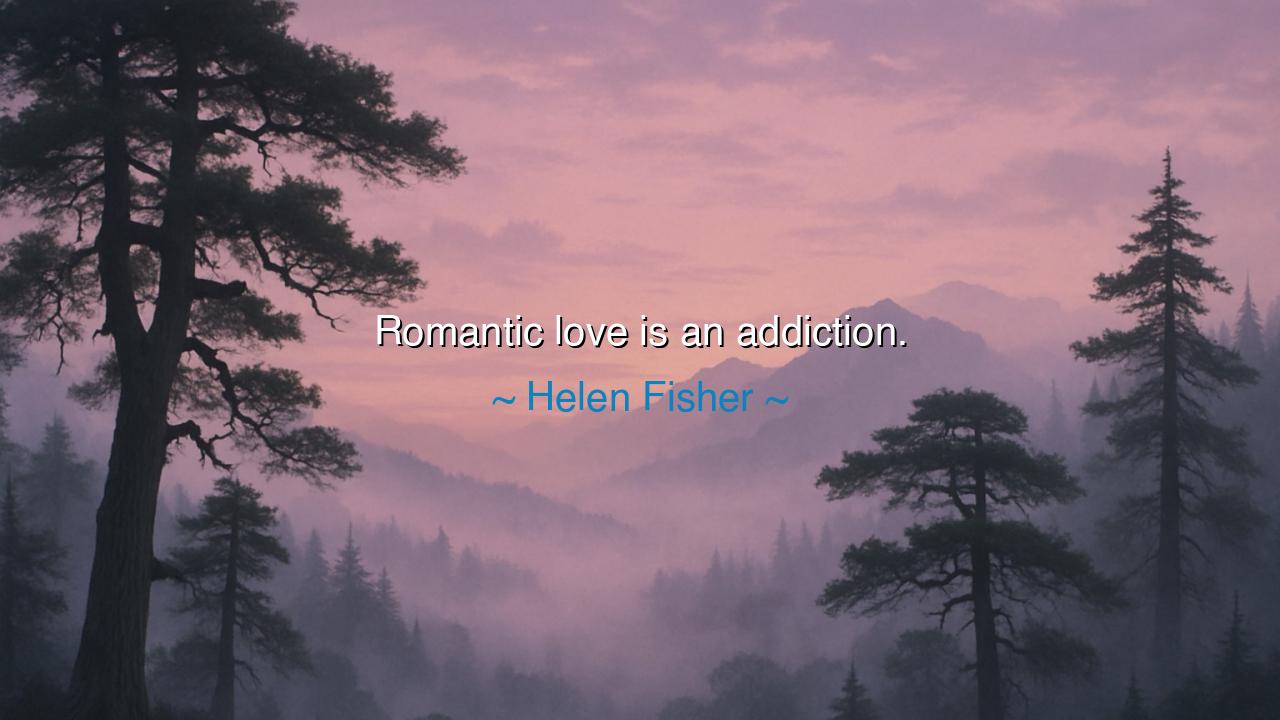
Romantic love is an addiction.






The wise scholar Helen Fisher once declared, “Romantic love is an addiction.” Though some might recoil at such a stark truth, the ancients would nod knowingly, for they too understood that love has the power to seize the soul, to bind it with chains both golden and terrible. To name it an addiction is not to belittle it, but to reveal its consuming fire. Like wine that gladdens the heart but enslaves the drinker when taken in excess, love enters the spirit with sweetness, yet demands from us a devotion that borders on surrender.
For what is an addiction but the relentless hunger for more? When struck by the arrows of love, men and women alike find their thoughts circling endlessly around the beloved. Appetite fades, sleep becomes restless, the mind is carried away as if by storm. The Greeks knew this well, for they spoke of Eros not as a gentle companion, but as a god who conquered even the mighty. He did not ask politely to enter—he struck, and the soul was undone. Fisher’s words echo that ancient knowledge: that romantic love is not mild, but overpowering, not casual, but compulsive.
Consider the tragic story of Tristan and Isolde. Bound by a potion, yes, but also by the natural fire of passion, they were caught in love so overwhelming that kingdoms crumbled and lives were lost. Their tale is not one of measured affection, but of enslavement to desire. Like those who cannot resist the call of a substance, they could not free themselves, even when wisdom bade them flee. Their destiny reminds us that romantic love as addiction can lift us into ecstasy but also plunge us into ruin, if left unchecked.
Yet, let us not think this truth entirely grim. For just as fire can scorch or warm, so too can this addictive force be turned toward life’s noblest ends. When properly guided, it inspires great acts of bravery and sacrifice. Empires have been built, poems have been written, wars have been fought, all because love consumed the heart and drove men and women to transcend their limits. To be so powerfully compelled is both a danger and a gift—it depends upon how we harness its force.
The ancients often counseled balance, and so must we. The Stoics, though cautious of passion’s grip, did not deny its power; rather, they urged that man learn to govern it, lest it govern him. If romantic love is indeed an addiction, then it must be treated with reverence, discipline, and awareness. For the same intensity that binds us to another can also blind us to truth, leading us into folly. The task, therefore, is not to deny love, but to ride its waves with wisdom.
The lesson, then, is clear: acknowledge love’s might as you would a roaring river. Do not imagine you can simply stand against it, for it will sweep you away. Instead, learn to guide your vessel upon its currents. Recognize the signs of obsession, the moments when devotion becomes captivity, and choose balance. Seek counsel from trusted voices, nurture friendships, and ground yourself in life’s other purposes, so that love does not consume all but becomes one radiant part of a greater whole.
Practically, this means cherishing romance while not forsaking self. It means tending to work, to purpose, to health, even as the heart yearns. It means remembering that love, like fire, burns brightest when given air to breathe, not when smothered in obsession. So take this teaching: romantic love is an addiction, but addiction may be channeled into creation, into art, into loyalty, into the building of a life both passionate and wise. Let each heart be strong enough to love, and wise enough to endure, without losing itself in the blaze.






AAdministratorAdministrator
Welcome, honored guests. Please leave a comment, we will respond soon